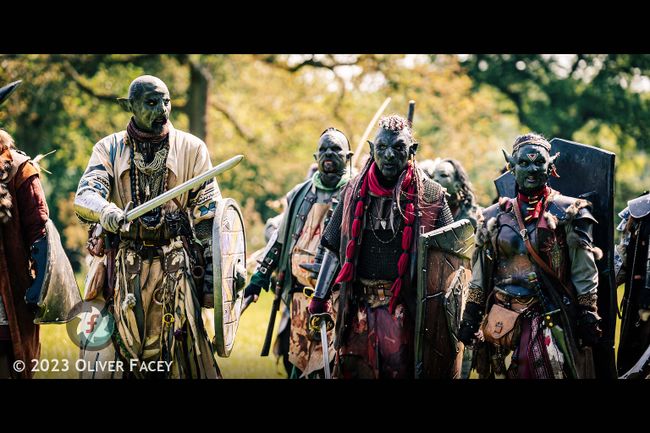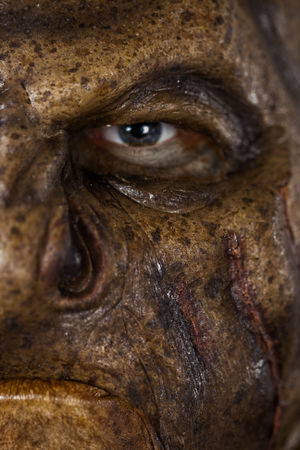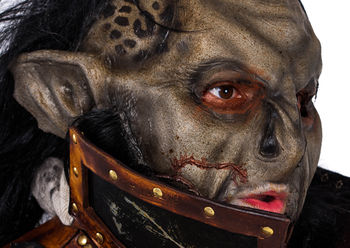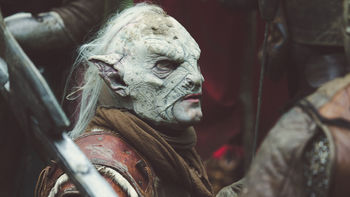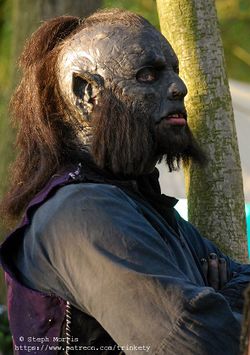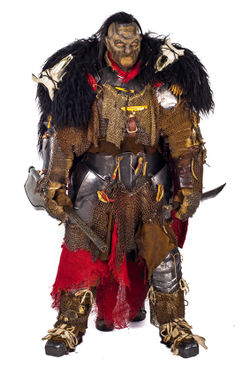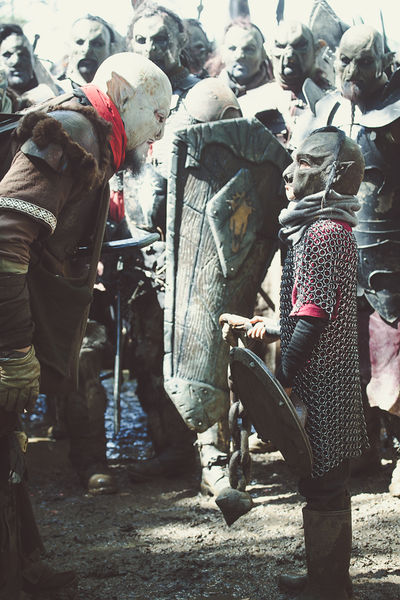Orc
Overview
Orcs are a tough physical people who are forceful and loyal. Their heavy bones and thick skin makes them well disposed to physical confrontation, and they derive a visceral enjoyment from conflict and physical competition. Orcs are as intelligent as humans, but they tend to prize simple resilient solutions to problems and disdain needless complexity.
There are only two options for player character orcs in the Empire. Most orcs are members of the Imperial Orc nation, and while the details on this brief are applicable to all orcs, they are written with the Imperial Orcs in mind. Following the city of Apulian joining the League, it is also possible to create an orc player character in that nation whose origin lies among its former Grendel citizens.
Orcs are most comfortable in groups with other orcs; they derive strength and reassurance by being surrounded by other members of the same legion or nation. When alone orcs tend to become anxious and lose much of their confidence and certainty. Orcs prefer their groups to adopt simple clear laws that are strongly enforced.
Orcs prefer roles where their natural strength, forceful personality and physical presence allows them to shine. They are drawn to military and religious leaders. The complex layered politics of the Senate often frustrates them, in the Synod and the Imperial Military their fire and enthusiasm for the Empire shine through.
Inspirations for orc characters include anyone strong and physical who revel in battle. Literary characters like Dr Edwin Hyde from Alan Moore's second League of Extraordinary Gentlemen graphic novel as well as figures like Hercules and Conan the Barbarian. Orcs are keen supporters of the law and characters like Judge Dredd, Johnny Alpha and Wulf Sternhammer have many orc qualities.
Orc leaders are usually forceful, hard-driving characters who derive their charisma and respect from their physical presence. The classic American tough-guy image of figures like Jesse Ventura, Arnold Schwarzenegger, George Patton or Dwight Eisenhower but also literary figures like the young Robert Baratheon, when he leads his rebellion against the Mad King.
The most important inspiration for orcs is the close physical camaraderie of soldiers. Marines and any mythical band of soldiers are a great basis for any group of orcs. Pvt. J. Vasquez and the other marines from Aliens, the squaddies from Dog Soldiers or the Vikings in 13th Warrior. Imperial Orcs find the discipline and order of the professional soldier appealing - the Ghurkas are a great inspiration for an orc legion.
What orcs are not
- Warhammer orcs or goblins. Orcs are a single species, rather than a set of related families of creatures encompassing goblins and other greenskins. Most orcs in the world of Empire have pale mottled skin as shown below, the bright green skin of Games Workshop orcs must be avoided.
Phys-rep
The Orc face and head is substantially different to the human visage. Unlike lineage, it does not vary wildly from one orc to the next- orcs are a single species that share a common appearance. To achieve the correct look requires a substantial prosthetic or mask which must cover most of the face as a minimum. It is advisable to leave the mouth clear, as this makes speech clearer and allows a much greater range of facial expression, but the rest of the face should be covered to achieve the right look.
It is not possible to achieve the required level of representation with a small prosthetic that covers just the eyes and temple or make-up alone, so please do not attempt this. Make-up is appropriate for all visible areas of skin that are not covered by clothing or prosthetics.
Players who are interested in creative looks using just make-up should look at the options available for humans with lineage.
Skin colour
Like human skin, orc skin colour covers a range of different shades, but most hues tends to be muted earth tones. Grey is the most common colour, followed by a dark drab olive shade. Black, brown and red-brown shades are also seen but are far less common, akin to true blonde hair colouring in humans. Some orcs have dark mottled patterns radiating from the temples to over the top the ears sometimes reaching as far as the back of the head. Old orcs often become albinos, their skin turning a bone white colour suddenly sometime past their sixtieth year.
Large ears
Orc ears end in points and most are much larger than human or even changeling ears. The ears usually sweep backwards following the curve of the skull and give the face a more feral appearance.
Upturned nose
All orcs have a large prominent nose. Many orcs noses have large forward facing open nostrils, giving the nose a flat face-on appearance. More human noses with down-turned nostrils are not unknown but in this case the skin over the bridge of the nose is often particularly thick and wrinkled. In some cases these folds continue up the nose and spread over the brow.
Bald head
Orcs never have eyebrows, and very few orcs are able to grow a full head of hair. Most have no hair on the temples and sides of the head and many are naturally completely bald. A very narrow crest of hair down the line of the skull like a mane or a single small patch near the top rear of the skull are normal for those orcs with any hair at all. Facial hair around the chin or cheeks is less common but not unknown.
Heavily Boned
Orcs have thick heavy bones (compared to a human of comparable height) which are prominent in the facial region. Highly defined cheek bones and brow ridges are common. Orc faces are rarely as expressive as human faces and orcs tend to use their voice and body language and gestures to communicate information rather than relying on subtle facial expressions.
Not Appropriate
- No bright colours. While many orcs have a greenish hue to their skin, no orcs have bright or lurid green flesh, this would be a sign of a deathly illness. Such an individual is not long for this world.
- Tusks or fangs. Most orcs have very human teeth if slightly sharper and more yellow than white. Very rarely orcs suffer from an infection in their teeth that causes them to grow in size becoming larger and more pronounced. This is very dangerous as the infection quickly results in the death of the orc if the enlarged teeth are not removed.
Psychology
Orcs are fundamentally different to humans in their psychology. They have different instincts, and these roleplaying effects are designed to try and draw out the alien nature of orcs.
Gregarious and Loyal
Orcs seek group identity; they want to belong to something, to be a part of a group that provides them with an identity and provides them with allies on whom they can rely utterly. These groups are usually close-knit and always fiercely loyal to each other, regardless of size. Most orcs are comfortable with this affinity and enjoy being part of a larger group, even while they maintain some sense of personal identity.
When orcs of the same group are together, even in small numbers, they gain confidence and mental and physical strength from each other. Orcs become more confident and more boisterous in the company of other members of their group. Without this support, they lose their natural assurance, and tend to become quiet, withdrawn and sullen. The more isolated the orc feels, the more they lose their confidence in themselves and their abilities.
Most orcs feel an instinctive loyalty towards their group that overrides fear or personal well-being. They put the best interests of the group first and make whatever sacrifices are necessary to do that. They want to be part of a group that expects this degree of solidarity, with clear rules that lays out what behaviour is expected. Betrayal of the group is a unforgivable crime in the eyes of any orc, but their loyalty to their group also tends to underpin a fierce support for the rule of law and order.
Groups cannot be arbitrary, they must be a fundamental part of an orc's identity. Most Imperial orcs live as part of a legion, treating all their fellow soldiers as brothers and sisters regardless of parentage. Barbarian orcs are divided into vast nations, with similar bonds of loyalty.
Revel in Battle
Orcs enjoy fighting. They are not battle-crazed or foolhardy, but they are not squeamish and their insensitivity to pain and injury means that they have little instinctive fear of being hurt. The flight-or-fight response in orcs is balanced differently than it is in humans, and orcs are much more likely to attack than they are to flee.
In battle groups of orcs can hear their ancestors talking to them and this further reinforces the strength they draw from each raising their spirits and enthusiasm further. Orcs thrive on the adrenalin of combat and conflict; fighting is physically exhilarating for orcs - a pleasurable experience that can become dangerously addictive for some.
Orcs are not blood-thirsty, it is the thrill of combat, the adrenalin of the fight response that they revel in. Without a challenge, without the tension and threat of a credible opponent there is no combat rush for them. Orcs swiftly lose all interest in fighting once an enemy is clearly defeated. They want to overpower their opponents, not to murder them.
Orcs also enjoy direct physical competition; violent confrontational sports are endemic in orc societies. The enjoyment of such bouts, by audience and participants is based on the same responses that make orcs revel and exult in fighting and battle.
Rules FAQ
- Orcs cannot use liao: An orc that consumes liao feels dizzy and unwell, and often throws up shortly afterwards. They do not receive a vision from true liao.
- Orcs cannot learn use Virtue skills: They cannot learn or use any religious skills. They cannot be affected by dedication, nor does Excommunication have any effect on them. They can be affected by auras, including those created through anointing, hallow, and consecration. They can also be subject to an exorcism, have their spirits marked through testimony or be perceived by insight.
- Orcs hear voices: Orcs hear the voices of their ancestors when they are in a heightened state, especially when fighting, angry or afraid. Some orcs hear their ancestors more often, and they are called shamans.
- Orcs draw strength from numbers. Orcs that are exposed to roleplaying effects that provoke them to question their loyalties or betray their group may respond by confronting the source of the effect if there is at least one other orc present who is a member of the same legion or band as the character.
- Humanoid biology: Orc biology differs a little from that of humans, but surgical skills, drugs and potions work on them the same way as they do anyone else.
The blood
Physiologically orcs are very similar to humans. They are hairy mammals with two sexes. They have slightly more bone and muscle mass, and build up and use fat stores more efficiently, as well as healing a little faster than humans do. They have roughly the same internal organs, and are capable of the physical act of mating with humans - although orc/human liaisons never result in offspring.
Until recently the average orc lifespan in the Empire was around 40 years due to the exertion and deprivation suffered as slaves. Since winning their freedom, improved nutrition and medical care has made it common for orcs to reach seventy or eighty years of age without showing any signs of slowing down. Despite this the normal maximum lifespan of an orc is equivalent to that of a human being.
Orcs mature at the same speed as humans, but they tend to stay vital and fertile for longer, It is normal for an orc of 50 or 60 to be as physically active as an orc of 20 years. The transition from adulthood to elder status is marked prominently in orcs. At some point after 60 years of age an orc undergoes a dramatic paling of the skin that takes place over the course of several months. This corresponds with the point at which an orc is no longer fertile. These albino orcs are respected as elders amongst most groups of orcs.
Orcs do not have lineage.
Lines of the Orcs
- The Imperial Orcs live in the Empire, where they form the newest of the ten nations. They are disciplined, loyal and civilised people very much at odds with the barbarians who surround them.
- The Jotun control the lands west of Wintermark and the Marches. A warrior-society with strong traditions of personal and tribal honour, and codes of behaviour in battle. They are known to enjoy warring with the Empire and engage in regular raids into Imperial territory.
- The Druj dominate the swamps and marshes to the east of Highguard and Varushka. They are notoriously devious and treacherous in their dealings with others. They make frequent use of poison on the battlefield, using herbs and magic to create powerful venoms to overcome their enemies.
- The Thule rule the wastelands north of Wintermark and Varushka. They are cautious and meticulous planners with a reputation for greed. They make extensive use of magic on and off the battlefield and often attack sites of power in the Empire.
- The Grendel are strongest on Attar, the great island south of the bay of Catazar. They have raided the nations on the shores of the bay in the past; although their individual vessels are no match for the superior Freeborn corsairs, their navies are a dire threat that the Empire struggles to match.
Suppliers
There is no requirement to use a mask from these suppliers but Mandala has been heavily involved with the creation of the visuals for Empire, and their orc masks have been created with the game in mind. The masks by Dogbane SFX are also valid for all orcs in the setting. Any mask that fits the description for the orcs in Empire is suitable, but if you want to check if a mask is ideal then you are welcome to email us.
